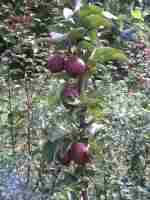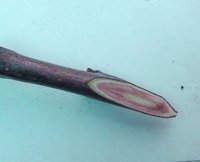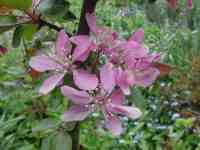
Reinhard Schomberg-Klee,
Göttingen, Germany
RED-FLESHED APPPLES IN GOTTINGEN
page 1: introduction
page 2: more seedlings and pictures, Oct 08
page 3: more seedlings and pictures, Nov 09
page 4: update, Oct 2011
Reinhard Schomberg-Klee is a nurseryman living in Göttingen, near the old East German border. He has an interest in
red-fleshed apples. He mentions the world-wide interest in these, especially in New Zealand, where there is
a serious breeding programme under way.
Reinhard is putting together a collection of red-fleshed apple trees at the Experimental
Botanic Garden of Göttingen, where he is working as a Head Gardener. .
He has also been growing seedlings of Malus 'Geneva' for five years. Some of these flowered for the first
time this spring (2007). The flowers of red-fleshed apples are generally spectacular; as good as a red-flowering
Japanese cherry.
(Malus 'Geneva' is a seedling of Niedzweckyana; a medium size fruit with red skin, dark red foliage, red flesh, and very tart flavor.)
Photographs of a few of these trees are shown below, along with remarks from Reinhard:

Malus 'Beienrode', a slowly -growing apple I found
in a village nearby called Beienrode.

Malus 'Geseke' x Bad Lippsringe; 3 year old seedlings of redfleshed apple trees I found 15 years ago,
named after the city where I used to work. Seedling in front of the corner has purple leaves shaped like a
birch.

Malus 'Pekacervenca', a Czechoslovakian variety.

Malus 'Beienrode', 1 year propogations together with 'Spencer Seedless',
a parthenocarpic type without pips (also a breeding goal of the New
Zealanders, because they don't need bees for pollination).

Again, Malus 'Beienrode'.
 .
.
 .
.

6 year old Malus 'Geneva' seedling with first fruit. Leaves and blossom are purple,
but flesh is white, so I called it "purple radish".

Field with 2 year propogations together with seedlings of Prunus
cerasifera "Nigra" (Blood Plum), growing rapidly.
Here are some open-pollinated seedlings of Malus Geneva growing in the greenhouse. About one third of them have purple leaves.
Every single seedling has its own genetic profile and could be, theoretically, a new variety. But only a small amount is tasty and worth propagating.

compiled by N.D / Diversity website